Members
Theme Leader :
Hiroyuki Suzuki, Ph.D.
Researcher :
Kumiko Nonaka, Ph.D., Ryota Sakurai, P.T., Ph.D., Susumu Ogawa, Ph.D., Tomoya Takahashi, Ph.D.
Associate Researcher :
Yasuhiro Sugawara
Adjunct Researcher :
Sachiko Murayama, Ai Iizuka, Momoko Kobayashi, Hiroki Mori, Daisuke Cho, Keiko Sugiura, Mai Takase, Masami Hasebe, Koji Fujita, Hiorko Matsunaga, Motoki Tanaka, Shinji Hattori, Yoji Inaba
Project staff: listed on the team website
Keywords
Productive ageing, social participation, social contribution, intergenerational relationship, multigenerational co-creation, social isolation, social capital
Major Research Titles
- Develop various programs and systems that contribute to the promotion of productive ageing
- Elucidate the physical and psycho-social mechanism of the effect of social participation to health, and develop a novel method to assess the degree of health.
Profile
The fundamental future vision that we imagine is to implement sustainable multigenerational society led by older adults. The basic principle is the Three GOODs; GOOD for older adult, GOOD for youngster, and GOOD for society. In order to achieve this ideal society, we have set two long term goals which far-sees 20 to 30 years in the future. Goal 《A》 is the implementation of communal society that enables seam-less social participation according to the degree of health of older adults. Goal 《B》 is the implementation of communal society that allows social actions that contribute to the formation of positive intergenerational relationship. Furthermore, three mid-term goals to achieve during the next five years (fiscal year of 2018 to 2023) were set. Those are 【1】 Increase the opportunities of various social participation, 【2】 Maintain and promote health by social participation, and 【3】Facilitate intergenerational understanding and bilateral support. We are working on the following researches to meet these goals.
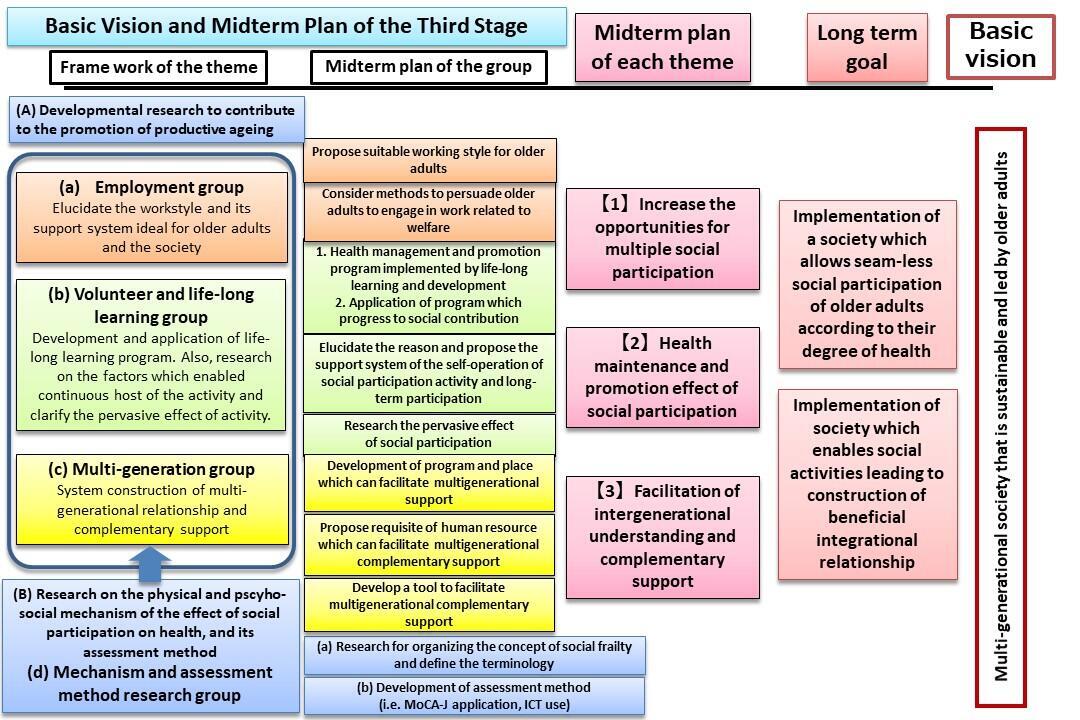
The research structure is divided into two sections which are mutually coordinated. Section A is a practical research to develop programs and systems with the aim to promote productive ageing. Section B is a fundamental research related to enlightening the physical and psycho-social mechanism of the effect of social participation to health, and development of its assessment method (Research Group of exploring social participation and health related mechanism, and its assessment method). Section A is further divided into three research groups that are related to social participation activity of older adults according to their functional health level: (a) employment support group, (b) promotion of volunteer and life-long learning group, and (c) multigenerational symbiosis group. Researches focusing on topics that relate to multiple research areas, such as work for life motivation, ikigai shyuro in Japanese, and intergenerational volunteer activities, are operated with the collaboration of multidisciplinary research fields.
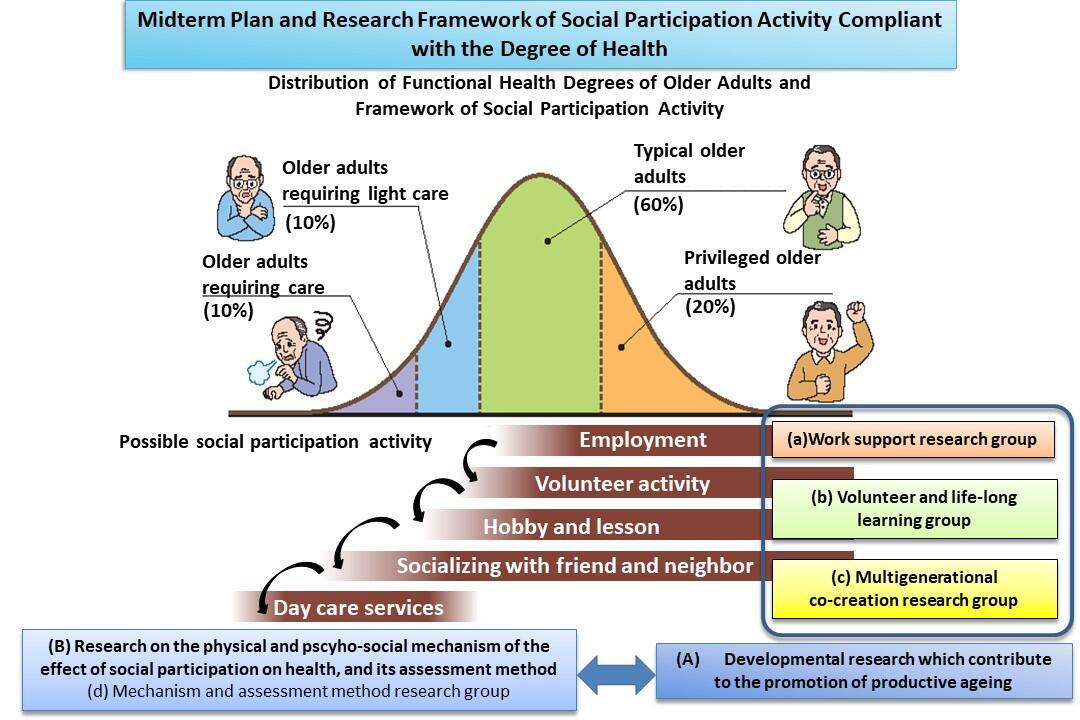
Listed below are the four specific research topics1. (a) The Employment Support Research will present the ideal workstyle and its support plans for older adults and society through discussions at research group meeting of experts (ESSENCE). Data from various cohort and employer research will also be analyzed. Furthermore, methods to encourage employment at welfare or social work sector, which social needs is extremely high, will be discussed. Research is being conducted to clarify the character of older adults who is involved in short-time jobs related to nursing (for example preparing, organizing, and guiding), and the effect of short-time jobs to the health of older adults. These results are being applied to job assistance projects, also known as ikigai shyuro shien syokai jigyo (projects to assist the introduction of work for life motivation), led by the city government.
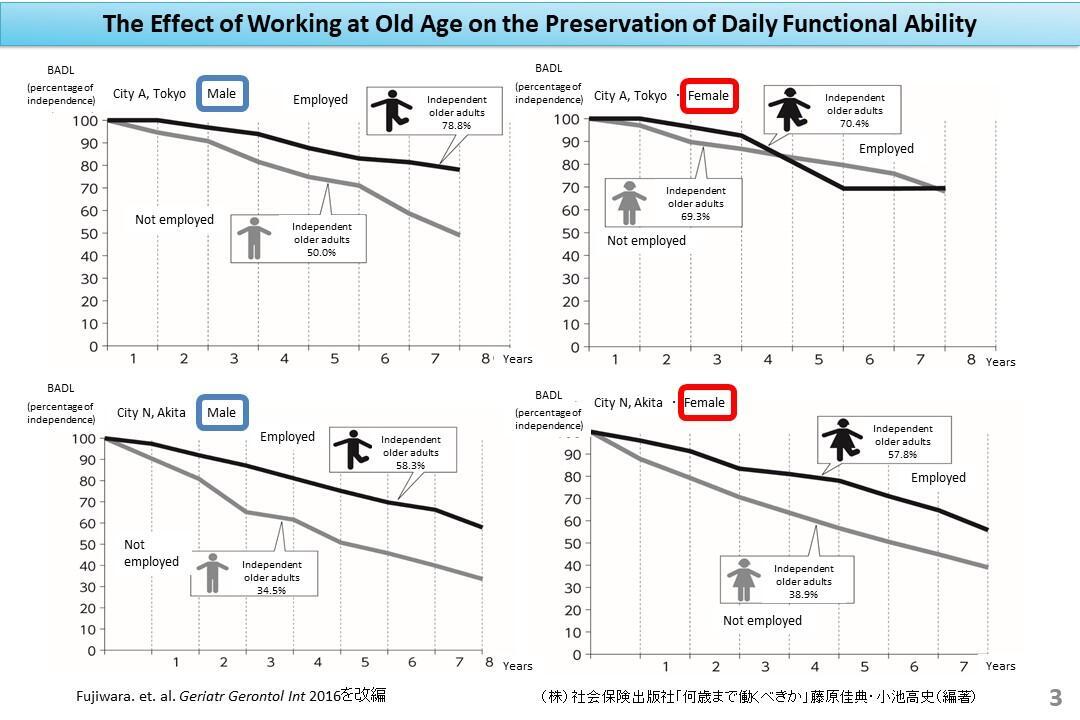
(b) The Research Group of Volunteer and Life-long Learning Facilitation has been developing and applying story telling program and various novel programs to (1) develop and implement life-long learning programs which maintain and promote health, and lead to social contribution, (2) elucidate the factors that enables long-term continuation of self-operating social participation activity, and present its support plans, and (3) verify the pervasive effect of social participation programs. Seventeen city governments, mainly located in the metropolitan area, have cooperated with the story telling program. Many groups that wished to self-operate and continue the story telling program have joined the NPO Association Reprint · Network. Registrants work as volunteers of the story telling program and participate in researches that aim to elucidate the challenges that older adults face when volunteering.
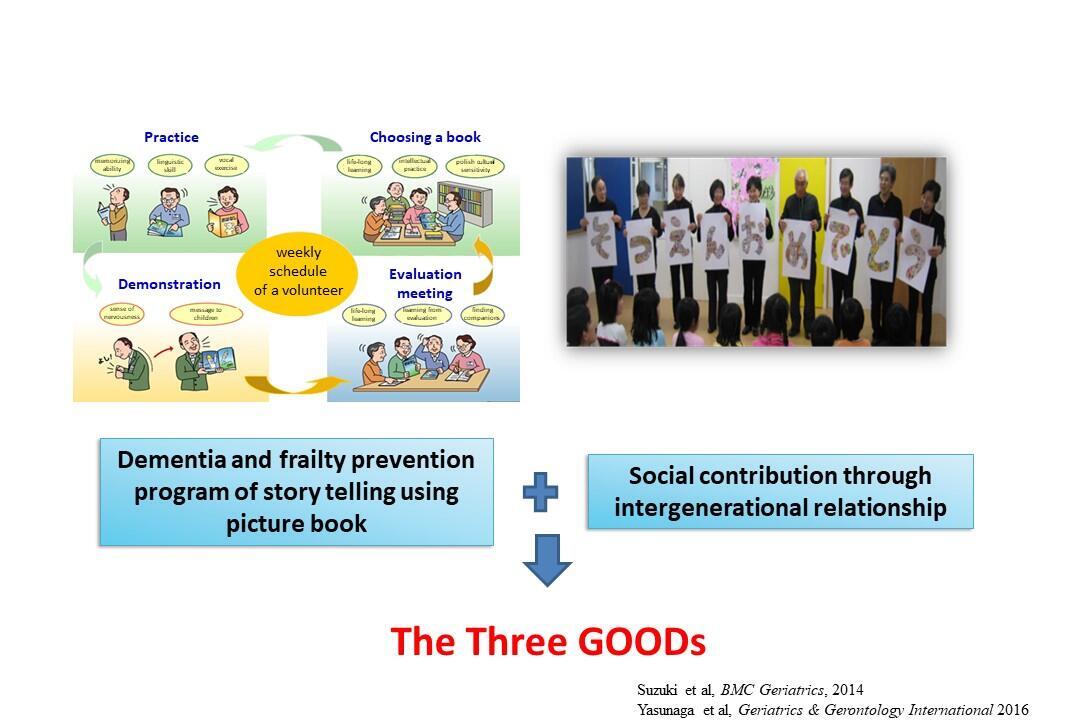
In addition, a new life-long learning program of Go, a Japanese board game, was developed for its beginners. The effect of the program to the cognitive function and brain function is being assessed.
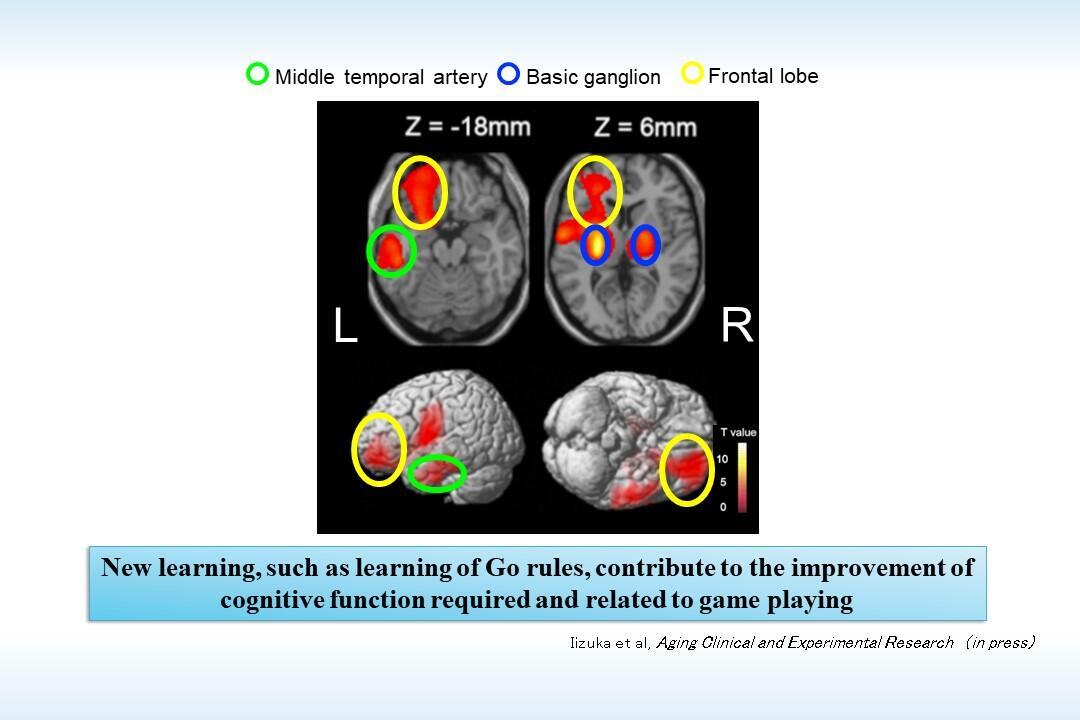
(c) The Research of Multigenerational Symbiosis Group aim to construct three-layer multigenerational interaction and support system and present good examples and requirements of place and program, human resource, and tools. This group works on action researches at metropolitan city governments and develop websites and training programs that coordinates the previous three factors. Quantitative researches focusing on factors associated with continuing or closing of salon, and qualitative researches focusing on the operation method of salons in the metropolitan area are conducted. These researches contribute to clarifying the operation method of multigenerational interaction station which promote resident to resident support. Furthermore, researches targeting model city government, manager of paid or volunteer work, and actual worker are hosted to elucidate the mechanism that launched the consociation which facilitate the support network among residents.
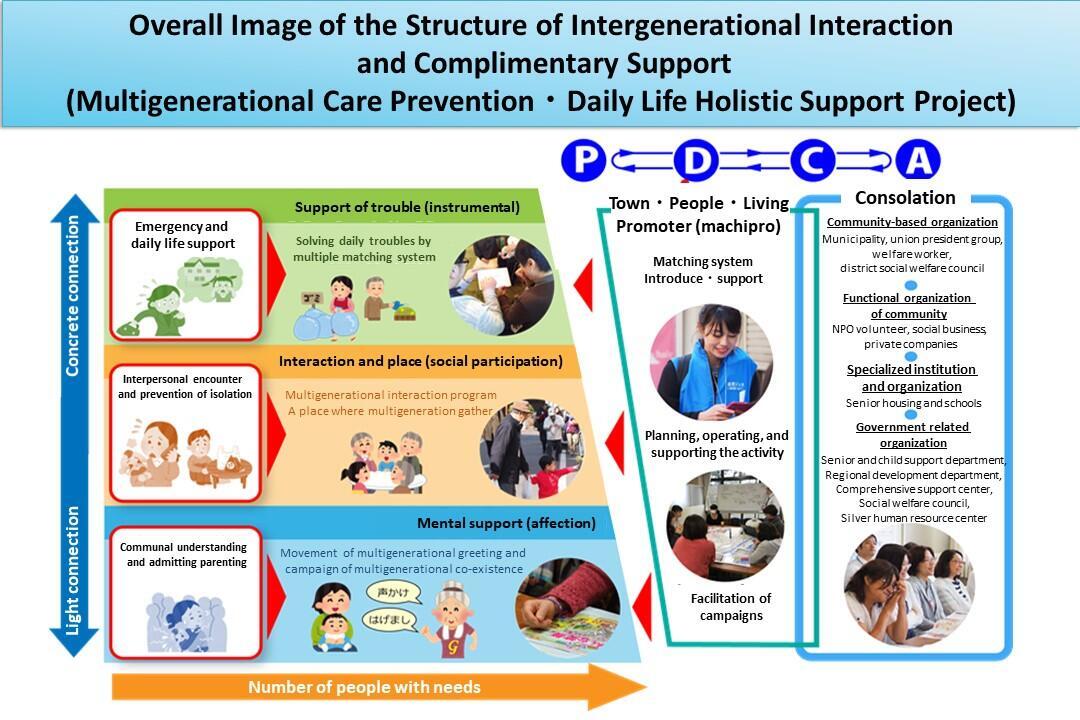
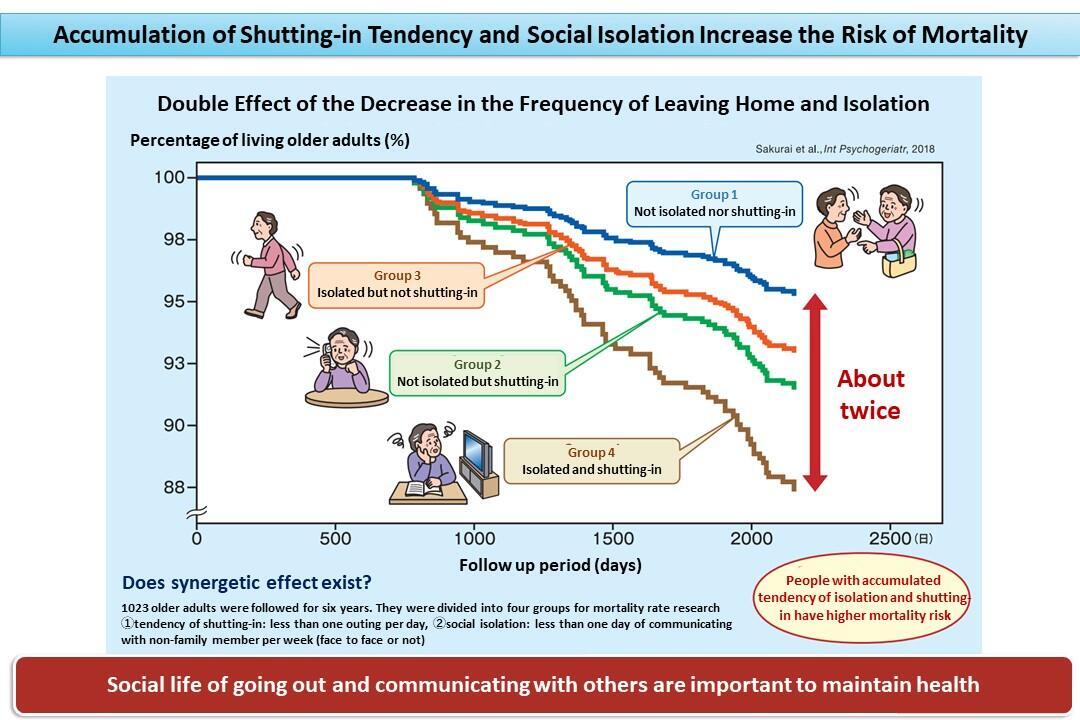

References
- Sakurai R, Kawai H, Suzuki H, Kim H, Watanabe Y, Hirano H, Ihara K, Obuchi S, Fujiwara Y: Association of eating alone with depression among older adults living alone: Role of poor social networks. Journal of Epidemiology (in press)
- Iizuka A, Ishii K, Wagatsuma K, Ishibashi K, Onishi A, Tanaka M, Suzuki H, Awata S, Fujiwara Y:Neural substrate of a cognitive intervention program using Go game: a positron emission tomography study. Aging Clinical and Experimental Research, 2020.1. Doi: 10.1007/s40520-019-01462-6
- Sakurai R, Kawai H, Suzuki H, Kim H, Watanabe Y, Hirano H, Ihara K, Obuchi S, Fujiwara Y: Poor Social Network, Not Living Alone, Is Associated With Incidence of Adverse Health Outcomes in Older Adults. J Am Med Dir Assoc, 20(11), 1438-1443, 2019.11.
- Murayama H, Amagasa S, Inoue S, Fujiwara T, Shobugawa Y: Sekentei and objectively-measured physical activity among older Japanese people: a cross- sectional analysis from the NEIGE Study. BMC Public Health, 19(1):1331, 2019.10.
- Sakurai R, Watanabe Y, Osuka Y, Taniguchi Y, Kawai H, Kim H, Kitamura A, Inagaki H, Montero-Odasso M, Awata S, Shinkai S: Overlap between Apolipoprotein Eε4 Allele and Slowing Gait Results in Cognitive Impairment. Frontiers in Aging Neuroscience, 11:247, 2019.9.
- Murayama H, Ura C, Miyamae F, Sakuma N, Sugiyama M, Inagaki H, Okamura T, Awata S: Ecological relationship between social capital and cognitive decline in Japan: A preliminary study for dementia-friendly communities. Geriatrics & Gerontology International, 19(9), 950-955, 2019.9.
- Takahashi T, Nonaka K, Matsunaga H, Hasebe M, Murayama H, Koike T, Kobayashi E, Fujiwara Y: Factors relating to social isolation in urban Japanese older people: A 2-year prospective cohort study. Archives of Gerontology and Geriatrics, 86, 2019.9.
- Iizuka A, Suzuki H, Ogawa S, Kobayashi-Cuya KE, Kobayashi M, Takebayashi T, Fujiwara Y: Can cognitive leisure activity prevent cognitive decline in older adults? A systematic review of intervention studies. Geriatrics & Gerontology International, 19(6): 469-482, 2019.6.
- Sakurai R, Kawai H, Suzuki H, Ogawa S, Kim H, Watanabe Y, Hirano H, Ihara K, Obuchi S, Fujiwara Y:An epidemiological study of the risk factors of bicycle-related falls among Japanese older adults. Journal of Epidemiology, 29(12):487-490, 2019.5.
- Nonaka K, Fujiwara Y, Watanabe S, Ishizaki T, Iwasa H, Amano H, Yoshida Y, Kobayashi E, Sakurai R, Suzuki H, Kumagai S, Shinkai S, Suzuki T: Is unwilling volunteering protective for functional decline? The interactive effects of volunteer willingness and engagement on health in a 3-year longitudinal study of Japanese older adults. Geriatrics & Gerontology International, 19(7), 673-678, 2019.4.
- Murayama Y, Murayama H, Hasebe M, Yamaguchi J, Fujiwara Y: The impact of intergenerational programs on social capital in Japan: a randomized population- based cross-sectional study. BMC Public Health, 19(156), 2019.2.
- Iizuka A, Suzuki H, Ogawa S, Kobayashi-Cuya KE, Kobayashi M, Inagaki H, Sugiyama M, Awata S, Takebayashi T, Fujiwara Y: Does social interaction influence the effect of cognitive intervention program? A randomized controlled trial using Go Game. International Journal of Geriatric Psychiatry, 2018.11. doi: 10.1002/gps.5024
- Kobayashi-Cuya KE, Sakurai R, Suzuki H, Ogawa S, Takebayashi T, Fujiwara Y:Observational Evidence of the Association Between Handgrip Strength, Hand Dexterity, and Cognitive Performance in Community-Dwelling Older Adults: A Systematic Review. Journal of Epidemiology, 28(9):373-381, 2018.9.
- Kobayashi-Cuya KE, Sakurai R, Sakuma N, Suzuki H, Yasunaga M, Ogawa S, Takebayashi T, Fujiwara Y:Hand dexterity, not handgrip strength, is associated with executive function in Japanese community-dwelling older adults: a cross-sectional study. BMC Geriatric, 18(1):192. 2018.8.
- Nemoto Y, Nonaka K, Hasebe M, Koike T, Minami U, Murayama Y, Murayama H, Matsunaga H, Fukaya T, Kobayashi E, Maruo K, Fujiwara Y:Factors that promote new or continuous participation in social group activity among Japanese community-dwelling older adults: a 2-year longitudinal study, Geriatrics & Gerontology International,18(8):1259-1266,2018.8.
- Sakurai R, Yasunaga M, Nishi M, Fukaya T, Hasebe M, Murayama Y, Koike T, Matsunaga H, Nonaka K, Suzuki H, Saito M, Kobayashi E, Fujiwara Y:Co-existence of social isolation and homebound status increase the risk of all-cause mortality. International Psychogeriatrics, 2018.7. doi: 10.1017/S1041610218001047
- Murayama H, Liang J, Shaw BA, Botoseneanu A, Kobayashi E, Fukaya T, Shinkai S: Age and gender differences in the association between body mass index and all-cause mortality among older Japanese. Ethnicity & Health, 4:1-14, 2018.5.
- Iizuka A, Suzuki H, Ogawa S, Kobayashi-Cuya KE, Kobayashi M, Takebayashi T, Fujiwara Y:Pilot Randomized Controlled Trial of the GO Game Intervention on Cognitive Function. American journal of Alzheimer's disease and other dementias, 33(3):192-198,2018.5
- Sakurai R, Bartha R, Montero-Odasso M:Entorhinal Cortex Volume Is Associated With Dual-Task Gait Cost Among Older Adults With MCI: Results From the Gait and Brain Study. Journal of Gerontology. Series A: Biological Sciences and Medical Sciences, 74(5):698-704. 2018.5.
- Sakurai R, Ishii K, Sakuma N, Yasunaga M, Suzuki H, Murayama Y, Nishi M, Uchida H, Shinkai S, Fujiwara Y:Preventive effects of an intergenerational program on age-related hippocampal atrophy in older adults: The REPRINTS study. International Journal of Geriatric Psychiatry, 33(2):e264-e272. 2018.2.
- Sakurai R, Ishii K, Yasunaga M, Takeuchi R, Murayama Y, Sakuma N, Sakata M, Oda K, Ishibashi K, Ishiwata K, Fujiwara Y, Montero-Odasso M:The neural substrate of gait and executive function relationship in elderly women: A PET study. Geriatrics & Gerontology International, 17(11):1873-1880. 2017.11, DOI: 10.1111/ggi.12982
- Sakurai R, Montero-Odasso M: Apolipoprotein E4 allele and gait performance in mild cognitive impairment: Results from the Gait and Brain Study. Journal of Gerontology. Series A: Biological Sciences and Medical Sciences: 72(12):1676-1682. 2017.11.
- Nonaka K, Suzuki H, Murayama H, Hasebe M, Koike T,Kobayashi E, Fujiwara Y:For how many days and what types of group activities should older Japanese adults be involved in to maintain health? A 4-year longitudinal study, Plos One, 12(9): e0183829. 2017.9
- Sakurai R, Fujiwara Y, Ishihara M, Yasunaga M, Ogawa S, Suzuki H, Imanaka K: Self-estimation of physical ability in stepping over an obstacle is not mediated by visual height perception: a comparison between young and older adults. Psychological Research, 81(4):740-749. 2017.7.
- Fujiwara Y,Nishi M,Fukaya T,Hasebe M,Nonaka K,Koike T,Suzuki H, Murayama Y,Saito M,Kobayashi E:Synergistic or independent impacts of low frequency of going outside the home and social isolation on functional decline: A 4-year prospective study of urban Japanese older adults. Geriatrics & Gerontology International,17(3), 500-508, 2017.3.







